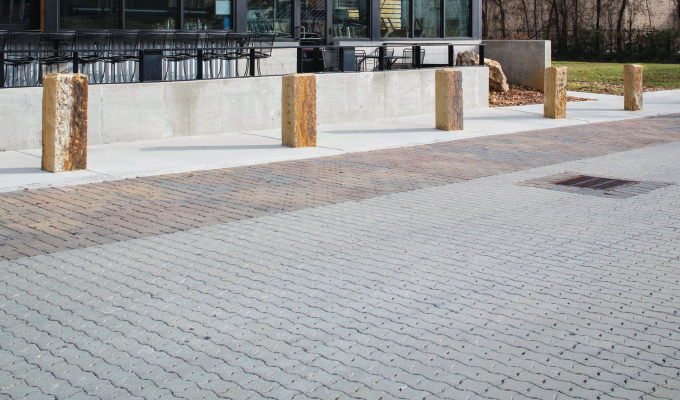Retrofit manages water runoff for city street
Max Poppel and Dan Rose began their entrepreneurial pursuits in 2011 when they opened The Crash Pad, a boutique hostel for adventure travelers located on Johnson Street’s Southside in Chattanooga. In 2013, as the travel refuge became increasingly popular, the pair decided to expand their enterprise by building a restaurant/bar called the Flying Squirrel on the adjacent property. But before finalizing plans for the restaurant, the partners had to overcome a major obstacle: the sewer system.
THE CHALLENGE
Chattanooga’s old-style sewer system, along with recent repaving efforts, had resulted in a temporary flooding problem that created ankle-deep pools at the intersection of Johnson and Passenger Streets. The partners asked city officials for some possible solutions, one of which was a straightforward partnership proposal—Poppel and Rose would pay for permeable interlocking concrete pavement (PICP) to completely resurface Johnson Street; in turn the city would handle the entire installation. The proactive plan would eliminate the flooding, address the intersection’s structural issues, and meet the city’s stringent stormwater management requirements for new construction. “The cost of the pavers roughly corresponded to the amount of street improvements we were going to have to do anyway,” says Poppel.
THE SOLUTION
After a careful vetting process, Belgard® permeable pavers manufactured by Adams Products, an Oldcastle Company, in Rockwood, Tennessee, were chosen for this Chattanooga pilot project. These durable pavers are specifically designed to manage water runoff while creating an aesthetically pleasing road surface with an attractive herringbone pattern and a curb-free design.
Darryl Sapp, Adams Products’ commercial consultant, explains the structural ingenuity that has allowed the Johnson Street makeover to remain in top condition and flood-free years after construction. According to Sapp, “The permeable pavers allow for rain water to be captured before entering the sewer system. The water passes directly through a wearing surface into an underlying stone reservoir that temporarily stores the surface runoff before infiltrating into the subgrade soil.” This a stark contrast to the street’s previous traditional black top which allowed no water absorption and created runoff problems during heavy rain fall. Sapp recalls, “The use of PICP helped meet the redevelopment stormwater requirements and avoid the cost of installing stormwater management infrastructure directly on the Flying Squirrel’s proposed site.”
MANAGING STORMWATER
The problem of excessive storm runoff has a lengthy history for Chattanooga. The antiquated water drainage system, which combines the city’s sewer system with its storm drains, poses ongoing challenges for city planners and engineers. Common in many older municipalities, the simple system does its job until a torrential downpour, which overstrains the capacity of the treatment plant and causes overflow of raw sewage into the Tennessee River, a haven for outdoor enthusiasts and a source of drinking water for communities across the Southeast.
Due to updated 2014 mandates by the EPA to reduce overflow, the city of Chattanooga instituted multiple stormwater management programs, including a requirement for all new builders to capture rainwater before it enters the sewer. Mark Heinzer, engineering manager for drainage and flood control for the city, has been at the forefront of implementing environmental changes for water management. He was involved in the Johnson Street Retrofit project from its onset and recalls that the endeavor was a launching point for the city’s PICP initiative. Heinzer notes that the Johnson Street project delivered a dual service to the area by creating an appealing and versatile new road surface that solved an existing drainage problem.
“It captures that excess water at its peak, reducing the potential for overflow, and the road structure has maintained its integrity,” explains Heinzer. Nearly 6 years after installation of the pavers, the engineer reports, “There have been zero problems with rainwater. The water goes right through the surface of the pavement and gets underground and is held there.”
PAVER SYSTEM SAVES
The paver system has proven much more cost-effective than traditional blacktop pavement. Pot holes are now a thing of the past and underground maintenance issues are vastly simplified. Heinzer cites the example of a recent water line break that occurred beneath Johnson street. “The Belgard PICP pavers were removed, the broken line was fixed, and the pavers were repositioned.” If the road had still been black-topped, jackhammers would have been required to tear up the pavement and the road surface would have had to be repaved after the fix. The permeable pavers saved time and money and avoided a noisy, messy repair on the bustling street.
CLOSING THOUGHT
Chattanooga is among the many cities seeking innovative solutions for aging infrastructures. The role of PICP in water abatement reflects an industry paradigm shift. It’s a solution to water management that works with the existing system. Realistically, cities across the country will have to replace outdated sewer systems in the decades to come, but the time and cost involved is astronomical and will most likely have to be done in increments. PICP systems offer viable long-term options that not only solve water run-off problems but alleviate the strain on besieged sewer systems.
For more information:
Belgard, part of Oldcastle APG, a CRH Company, offers a complete collection of paver and wall products for outdoor living spaces, walkways, driveways, parking areas, and retaining walls. For more, visit www.belgard.com.
Modern Contractor Solutions, January 2020
Did you enjoy this article?
Subscribe to the FREE Digital Edition of Modern Contractor Solutions magazine.



